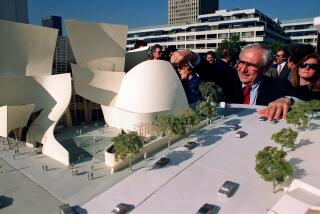Timely ‘Dr. Ehrlich’ in Dieterle Tribute
- Share via
A tribute to director William Dieterle continues Tuesday at 7 p.m. at the Goethe Institute, 5700 Wilshire Blvd., Suite 110, with the timelier-than-ever “Dr. Ehrlich’s Magic Bullet” (1940). This handsome Warner Bros. period piece is exemplary for many reasons: as one of the most engrossing and least pretentious of the “great man” film bios of its era, as an example of studio craftsmanship at its most conscientious and as the very model of splendid screenwriting.
It illuminates the heart and mind of a kindly genius, the times he lived in and above all, brings admirable clarity to Ehrlich’s Nobel Prize-winning scientific discoveries. John Huston, Heinz Herald and Norman Burnside, whose idea it was to tell Ehrlich’s story on screen, provided Dieterle with a virtually flawless script, which he in turn directed with sensitivity, understatement and that briskness of pace that is such an admirable Warners hallmark.
Edward G. Robinson is so much the archetypal screen gangster that it’s easy to forget the immense range he revealed in his long and distinguished career. Ehrlich is for him a perfect role: a man who is courageous, civil, brilliant, humane, possessed of a dignity that kept him above the frays that forever threatened to engulf him.
The supporting cast, headed by a remarkably subdued Ruth Gordon as his staunch wife, is large and impressive, as are James Wong Howe’s black-and-white cinematography and Max Steiner’s surprisingly discreet score. The film charts Ehrlich’s lifelong struggle against Germany’s rigidly doctrinaire scientific/medical Establishment.
Ehrlich (1854-1915) was a bacteriologist who came to believe that “there will come a time when all resistance to disease will be manufactured in a test tube.” The film is notable for its warmth and lack of heavy-handedness in dealing with both closed minds and the anti-Semitism that could always loom up and hinder Ehrlich’s work.
The film’s final line is ringingly prophetic in the light of the age of AIDS, and it contains Ehrlich’s observation that there can be no cure for all the diseases of the body unless there are also cures for the diseases of the soul.
Information: (213) 525-3388.
Timeless Treat: The Los Angeles Conservancy’s seventh annual “Last Remaining Seats,” a series of classic films presented in historic theaters, continues Wednesday with the presentation of “A Night at the Opera” (1935) at the Palace Theater, 630 S. Broadway. It should be a treat to see this timelessly funny and zesty Marx Brothers hit on the big screen instead of the tube, and the Palace is the perfect setting. This charming bandbox of a theater opened in 1911 as the Orpheum, and as such is not only the oldest operating theater on Broadway but the oldest surviving Orpheum Theater anywhere.
“A Night at the Opera” is good for whatever ails you. Bursting with anarchic high spirits, it finds Groucho promoting that definitive grande dame, Margaret Dumont, into high society via a $200,000 contribution to Sig Rumann’s New York opera company, where Kitty Carlisle is about to make her debut--and who is eager to get her true love Allan Jones promoted out of the chorus. Chico is on hand to sign up as Jones’ manager, Harpo to strum his harp and both to contribute mightily to the general mayhem.
How timeless is Groucho’s sharp but never truly cruel humor that deflates all pretense and pomposity. How witty and good-natured are Carlisle and Jones as the love interest--no grandiose Nelson and Jeanette are they, and how deftly has director Sam Wood kept everything fast and bubbly. The film features such classic moments as the jampacked ocean liner stateroom sequence and a hilarious demolishment of “Il Trovatore.” On June 30, Chaplin’s “City Lights” will be at the Los Angeles Theater, which opened in 1931. Information: (213) 623-CITY.
Sooraj R. Barjatya’s operetta-like “When Love Calls,” in a fine English-language version, screens Thursday only at 8 p.m. at the Four Star, 5112 Wilshire Blvd.
Information: (213) 936-3533 or (714) 647-2468.
More to Read
Only good movies
Get the Indie Focus newsletter, Mark Olsen's weekly guide to the world of cinema.
You may occasionally receive promotional content from the Los Angeles Times.










